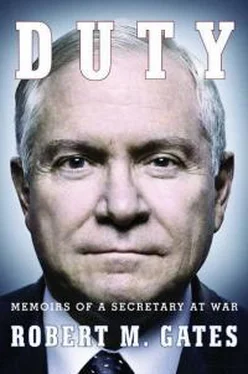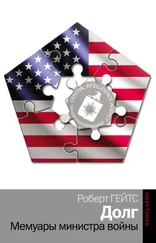THE WARS
I was brought in to help salvage the war in Iraq and, as it turned out, to do the same in Afghanistan—in short, I was asked to wage two wars, both of them going badly when I reported for duty. When I arrived in Washington, we had already been at war in Afghanistan longer than the United States had been in World War II, and at war in Iraq longer than our participation in the Korean War. Afghanistan would become the nation’s longest foreign war, Iraq the second longest. By the end of 2006, America was sick of war. And so was Congress.
In an earlier time, people would speak of winning or losing wars. The nearly seventy years since World War II have demonstrated vividly that while wars can still be lost (Vietnam, nearly so in Iraq), “winning” has proved difficult (from Korea to the present). In December 2006, my goals in our wars were straightforward and I think relatively modest, but they still seemed nearly unattainable. As I believe I have already made clear, in Iraq, I hoped we could stabilize the country in such a way that when U.S. forces departed, the war there would not be viewed as a strategic defeat for the United States, or as a failure with global consequences; in Afghanistan, I sought only an Afghan government and army that were strong enough to prevent the Taliban from returning to power and al Qaeda from returning to use the country again as a launching pad for terror. These goals were more modest than President Bush’s, especially since I thought establishing democratic rule and effective governance in both countries would take far more time than we had. I believe my minimalist goals were achieved in Iraq and remain within reach in Afghanistan as of this writing.
Had I been secretary of defense during the winter of 2002–3, I don’t know whether I would have recommended that President Bush invade Iraq. Because I am widely characterized as being a “realist” in foreign policy—like my mentors Brent Scowcroft and Zbigniew Brzezinski, both of whom opposed the invasion—many people assume I opposed the war or somehow would have prevented the debacle that followed had I been in a position of influence. But it would be disingenuous to say with ten years’ hindsight that I would have been opposed, especially since I publicly supported the decision at the time. With my CIA analyst’s background, I might have questioned the intelligence reporting on weapons of mass destruction more aggressively. Perhaps I would have made the same arguments against attempting regime change and occupying Iraq that I made before the Gulf War in 1990–91. I certainly hope that, following the initially successful invasion, I would have been able to prevent or mitigate some of the disastrous decisions that followed. But this is all speculation on my part.
What is clear ten years later, though, are the huge costs of the Iraq War. It lasted eight years, more than 4,000 American lives were lost, 35,000 troops were wounded (the number of Iraqis in both categories many times that), and it easily cost over $1 trillion. The overthrow of Saddam and the chaos that followed in Iraq eliminated Iran’s worst enemy and resulted in a significant strengthening of Tehran’s position in the region—and within Iraq itself. I cannot honestly claim I would have foreseen any or all of that.
As I often said while in office, only time will tell whether the invasion of Iraq was worth its monumental cost. The historical verdict, I suspect, will depend on how Iraq evolves and whether the overthrow of Saddam comes to be accepted as the first crack in decades-long Arab authoritarianism that will eventually bring significantly greater freedom and stability to the entire Middle East. However the question is ultimately answered, the war will always be tainted by the harsh reality that the public premise for invasion—Iraqi possession of chemical and biological weapons as well as an active nuclear program—was wrong.
As much as President Bush detested the notion, our later challenges in Afghanistan, especially the return of the Taliban in force by the time I became defense secretary, were, I believe, significantly compounded by the invasion of Iraq. Resources and senior-level attention were diverted from Afghanistan. U.S. goals in Afghanistan—a properly sized, competent Afghan national army and police, a working democracy with at least a minimally effective central government—were embarrassingly ambitious (and historically naïve) when compared to the meager human and financial resources committed to the task, especially before 2009. We were not effective early on in building the Afghan security forces. The number of Afghan troops we envisioned initially was far too low. We allowed rotating commanders to change training plans and approaches midstream, and too often we tried to build the Afghan forces in our own image, not based on a more sustainable indigenous design. The training effort did not really take off and begin to yield success until 2008. We remained woefully ignorant about the relationships and history among key tribes, clans, villages and provinces, individuals, families, and power brokers.
President Obama simply wanted the “bad” war in Iraq to be ended and, once in office, the U.S. role in Afghanistan—the so-called good war—to be limited in scope and duration. His fundamental problem in Afghanistan was that his political and philosophical preferences (not surprisingly shared by his White House advisers) conflicted with his own pro-war public rhetoric (especially during the presidential campaign and even in papers prepared during his presidential transition), the nearly unanimous recommendations of his senior civilian and military advisers at State and Defense, and the realities on the ground in Afghanistan.
One positive result of the continuing fight over Afghan strategy in the Obama administration was that the debate and resulting presidential decisions led to a steady narrowing of our objectives—our ambitions—there. I had believed this necessary as early as my job interview with Bush in November 2006.
Obama’s decision to dramatically increase the number of U.S. troops in Afghanistan in late 2009 was, as we have seen, based on a number of assumptions agreed upon by his top advisers: that the Pakistanis could be induced to change their hedging strategy, Karzai could be coached to become a more effective president, Afghan corruption could be reduced, and the Afghan central government’s reputation among the people and its capabilities could be improved. The challenges to achieving those goals were fully debated leading up to the president’s major troop escalation in the fall of 2009. Still, I think there was a good deal of wishful thinking in the Obama administration that we might see some improvements with enough dialogue (with Pakistan) and civilian assistance to the Afghan government and people. When real improvements in those nonmilitary areas failed to materialize, too many—especially in the White House and the NSS—concluded the president’s entire strategy, including the military component, was a failure and were eager to reverse course.
On the other hand, I pushed hard for the troops requested by McChrystal because I became convinced that my own minimalist objectives could be achieved without significant improvements in those other, nonmilitary arenas. If our troops, combined with larger and more capable Afghan forces, could provide security for much of the population, then the other improvements could follow over time. If there was one useful lesson from Iraq, I thought, it was that security for much of the population could, indeed must, precede other progress. This was why I could not sign on to Biden’s counterterrorism strategy: “whack-a-mole” hits on Taliban leaders were not a long-term strategy. By the same token, the blended counterterrorism-counterinsurgency strategy to provide security for population centers like Kandahar probably should have been implemented with a tighter focus geographically, paying less attention to sparsely populated areas, such as parts of Helmand.
Читать дальше












